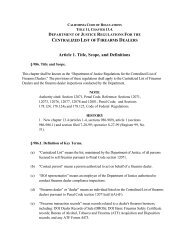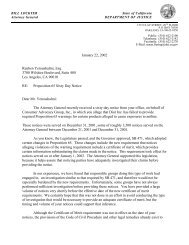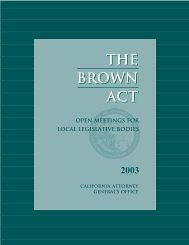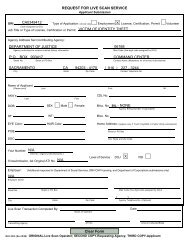Legal Rights of Persons With Disabilities - Ossh.com
Legal Rights of Persons With Disabilities - Ossh.com
Legal Rights of Persons With Disabilities - Ossh.com
Create successful ePaper yourself
Turn your PDF publications into a flip-book with our unique Google optimized e-Paper software.
CHAPTER 10<br />
CIVIL RIGHTS OF PERSONS WITH<br />
MENTAL AND DEVELOPMENTAL DISABILITIES<br />
I. CIVIL RIGHTS OF PERSONS WITH DEVELOPMENTAL DISABILITIES<br />
A. Federal and State <strong>Rights</strong><br />
In 1975, Congress enacted the Developmental <strong>Disabilities</strong> Assistance and Bill <strong>of</strong> <strong>Rights</strong> Act, which<br />
provides funding for programs and expresses the federal goal <strong>of</strong> legal and human rights for people with<br />
developmental disabilities. (42 U.S.C. ' 15001 et seq.)<br />
The Act defines developmental disability as a severe, chronic disability <strong>of</strong> an individual which:<br />
$ is attributable to a mental or physical impairment or <strong>com</strong>bination <strong>of</strong> mental and physical impairments;<br />
$ manifests itself before age 22;<br />
$ is likely to continue indefinitely;<br />
$ results in substantial functional limitations in three or more <strong>of</strong> the following areas <strong>of</strong> activity: selfcare,<br />
receptive and expressive language, learning, mobility, self-direction, capacity for independent<br />
living, and economic self-sufficiency; and<br />
$ reflects the person's need for a <strong>com</strong>bination and sequence <strong>of</strong> special, interdisciplinary, or generic<br />
services, individualized supports, or other forms <strong>of</strong> assistance that are <strong>of</strong> lifelong or extended duration<br />
and are individually planned and coordinated; or<br />
$ an individual from birth to age 9, inclusive, who has a substantial developmental delay or specific<br />
congenital or acquired condition, may be considered to have a developmental disability without<br />
meeting three or more <strong>of</strong> the criteria described above if the individual, without services and supports,<br />
has a high probability <strong>of</strong> meeting those criteria later in life.<br />
(42 U.S.C. ' 15002(8))<br />
It is the government's policy to encourage states to provide appropriate treatment, services and<br />
habilitation to people with developmental disabilities. ("Habilitation" means the education, treatment and care<br />
required by developmentally disabled people to achieve their maximum development.) Treatment should<br />
maximize the developmental potential <strong>of</strong> an individual and should be provided in the least restrictive setting<br />
possible. (42 U.S.C. ' 15009.)<br />
California law similarly protects the constitutional rights <strong>of</strong> people with developmental disabilities,<br />
including the right to treatment, habilitation, dignity, privacy and humane care and the right to be free from<br />
hazardous procedures, unnecessary physical restraint, isolation, excessive medication, abuse or neglect. (Welf.<br />
& Inst. Code, ' 4500 et seq.)<br />
B. Institutionalization <strong>of</strong> <strong>Persons</strong> <strong>With</strong> Developmental <strong>Disabilities</strong><br />
In California, the presence <strong>of</strong> a developmental disability alone cannot justify <strong>com</strong>mitment to an<br />
68













